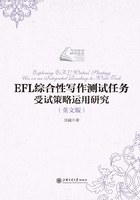
CHAPTER TWO LITERATURE REVIEW
Most educators have accepted the assumption that learning strategy use serves as an indicator differentiating low-performing from high-performing learners(Brown et al.1983).Given this assumption,earlier research in the field of second language acquisition(SLA)has also begun to recognize the effects of learning strategies on learners’language acquisition(e.g.,Cohen 1984,1987;Clahsen 1987;Chamot 1987;Wenden 1991),a few of which found that these strategies are associated with performance(e.g.,Politzer and McGroarty 1985;Huang and Van Naerssen 1985;Jamieson&Chapelle 1987).Since one important aspect of language assessment research is the investigation into the factors that account for variance in test scores,the findings of the aforementioned strategy studies have begun to arouse interest from testers.As Purpura(1996)figured out,
“...as strategy use may very well turn out to have a significant impact on the variation of test scores.For this reason,the investigation into the relationships between strategy use and language test performance is an essential part of the process of construct validation of language tests with far-reaching implications for language educators and testers alike”(p.23).
This chapter synthesizes relevant theoretical and empirical research that has contributed to the rationale of the present study.The focus of this research is subjects’strategy use and their performance on an integrated reading-to-write task.It attempts,through investigating subjects’performing processes,to establish a framework that is supposed to be constructed by the contribution of various components of strategy use and,at the same time,to describe the nature of the strategy use.Therefore,it is essential to know,firstly,the mental operations in writing since those discussions could be informative concerning what writers actually proceed in mind and what specific strategies they draw on while writing an essay as a response to a certain given topic,which constitutes the first pillar for the review of literature.The second pillar comprises the constructivist discourse synthesis theory since what makes reading-to-write construct different from that of a writing-only task lies in the providing of source texts,and reading-to-write behaviors in this study are perceived as meaning-constructing processes highly dependent on the writers’ability to synthesize information from source texts;therefore,the theory elaborating organizing,selecting and connecting content from given source texts provides insights into the study of strategy use in integrated writing tasks.
The previous research probing into integrated writing tasks has investigated either written products or writing processes,which will be reviewed in the third part of the literature review for the purpose of providing a relatively clear overview on the extent to which the task type has been researched so far.What’s more,since the construct of strategy use cannot be directly observed,it could be informative to review the possible methods of eliciting strategy use to bridge the literature review and research methodology delineated in Chapter Three.